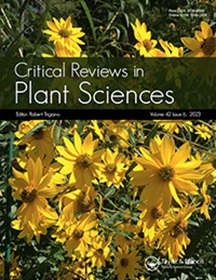面向未来农业的新型异源多倍体作物的创造与重新改良
IF 4.9
2区 生物学
Q1 PLANT SCIENCES
引用次数: 1
摘要
发展适应气候变化的作物有助于应对日益增长的世界人口的威胁。多倍体在被子植物进化过程中占有重要地位,是决定植物生物多样性、生长活力、环境适应性和新化合物形成的关键因素。本文综述了利用有性和无性途径培育异体多倍体的进展和应用,以及它们的潜在优势和存在的问题。我们描述了多倍体如何在细胞遗传学、遗传学和表观遗传学水平上引起严格的基因组修饰,重点介绍了新合成的异源多倍体基因组组装的最新进展。尽管在许多属中成功地创造了新的异源多倍体,但它偶尔会产生不良性状,影响新合成的异源多倍体的利用。通过基因组编辑重新驯化野生物种的最新进展为创造新作物以确保全球粮食供应提供了一条途径。按照这一策略,利用基因组编辑技术对新合成的异源多倍体进行从头改进,可以迅速改善新合成的异源多倍体,以满足农业需求,并使植物育种者能够跟上全球变化的步伐。本文章由计算机程序翻译,如有差异,请以英文原文为准。
Creating and De Novo Improvement of New Allopolyploid Crops for Future Agriculture
Abstract The development of climate change resilient crops is conducive to meeting the increasing threat of supporting the growing world population. Polyploidy occupies an important position in angiosperm evolution, as a key factor that shapes plant biodiversity, growth vigor, environmental adaptation, and emerging chemical compounds. In this review, we outlined the development and application of creating new allopolyploids using sexual and asexual approaches and their potential benefits and problems. We described how polyploidization caused strict genome modification at cytogenetic, genetic, and epigenetic levels with emphasis on the latest update on genome assembly of newly synthesized allopolyploids. Despite the success in creating new allopolyploids in many genera, it occasionally gave rise to undesirable traits to impact the utilization of newly synthetic allopolyploids. Recent developments in the de novo domestication of wild species through genome editing provide a route to create new crops to secure the global food supply. Following the strategy, de novo improvement of newly synthetic allopolyploids using genome editing could be galvanized to rapidly improve newly synthesized allopolyploids to meet agriculture demands and enable plant breeders to keep pace with global changes.
求助全文
通过发布文献求助,成功后即可免费获取论文全文。
去求助
来源期刊
CiteScore
12.90
自引率
1.40%
发文量
15
审稿时长
>12 weeks
期刊介绍:
Critical Reviews in Plant Sciences focuses on presenting in-depth and up-to-date reviews of timely and/or cutting-edge subjects in the broad discipline of plant science, ranging from molecular biology/biochemistry through the areas of cell biology, plant pathology and physiology, genetics, classical botany, and ecology, to practical agricultural applications. Articles in the journal provide an up-to-date literature base for researchers and students, pointing the way towards future research needs. The journal is also a significant source of credible, objective information to aid decision makers at all levels.

 求助内容:
求助内容: 应助结果提醒方式:
应助结果提醒方式:


